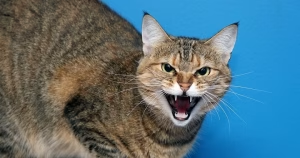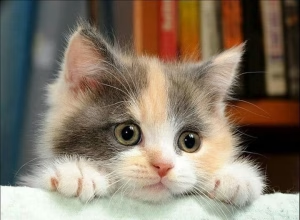Cats have a reputation for being curious about everything, including what’s on your plate. If you’re someone who enjoys healthy meals packed with chickpeas whether in hummus, salads, or stews you might wonder, can cats eat chickpeas?
The short answer is that cats can eat chickpeas in small, plain amounts, but they offer little nutritional value for felines and may cause digestive issues. While chickpeas are not toxic to cats, they are not an ideal part of a cat’s diet. Understanding how legumes like chickpeas affect your cat’s health is key before offering a bite.
Are Chickpeas Safe for Cats?

Chickpeas, also known as garbanzo beans, are safe in the sense that they are not poisonous or immediately harmful to cats. However, safety does not mean suitability. Cats are obligate carnivores, which means their bodies are designed to thrive on animal-based proteins and fats. Chickpeas are high in plant-based protein, fiber, and carbohydrates—none of which are necessary in large amounts for feline health.
Feeding your cat chickpeas occasionally and in moderation may not cause harm, especially if they’re plain and thoroughly cooked. But making it a habit can lead to complications.
Nutritional Profile of Chickpeas
Chickpeas are considered a superfood for humans because of their high content of protein, fiber, iron, folate, and other essential nutrients. However, for cats, the nutritional value changes significantly.
Nutritional elements in chickpeas:
- Plant-based protein
- Fiber
- Iron
- Magnesium
- Folate
- Carbohydrates
For cats, most of these nutrients either already exist in their meat-based food or are not easily digestible from plant sources. Cats also lack the enzymes to properly break down certain carbohydrates found in legumes.
Risks of Feeding Chickpeas to Cats
Digestive Discomfort
Cats’ digestive systems are not built to handle large amounts of fiber or carbohydrates. Eating too many chickpeas may lead to bloating, gas, stomach pain, or diarrhea. Even small amounts might cause discomfort in sensitive cats.
Choking Hazard or Blockage
Whole chickpeas, especially if dry or undercooked, can be hard for cats to chew or digest. There’s a small risk of choking or intestinal blockage, particularly in kittens or older cats with dental issues.
Seasonings and Additives
Most chickpeas prepared for human consumption include seasonings, garlic, onion, salt, or oil. These additives are harmful and even toxic to cats. Garlic and onion can cause damage to red blood cells, while salt can lead to dehydration or sodium poisoning.
Hummus Is a No-Go
Even though hummus is made primarily from chickpeas, it often contains tahini, garlic, lemon juice, salt, and olive oil. All of these ingredients, especially garlic, make hummus completely unsafe for cats. Even a small lick can pose a risk.
Do Cats Benefit From Chickpeas?
In short, not really. While chickpeas do contain protein, cats require animal protein, which contains the full range of essential amino acids like taurine. Plant-based proteins do not meet these requirements. Cats also need fats and nutrients that chickpeas simply don’t provide.
Feeding chickpeas regularly won’t contribute positively to your cat’s overall health. Instead, it may take up space in their diet that should be reserved for nutrient-dense animal foods.
Can Kittens Eat Chickpeas?
Kittens have very specific nutritional needs to support rapid growth and development. Feeding chickpeas to a kitten is not advisable. Their digestive systems are even more sensitive than adult cats, and plant-based foods can cause more harm than good. Stick to high-quality kitten food and approved animal protein sources only.
How to Feed Chickpeas to Cats Safely
If you’re still interested in letting your cat try chickpeas, it’s best to follow these guidelines:
- Use plain, cooked chickpeas only.
- Avoid canned chickpeas that contain salt or preservatives.
- Do not feed raw or undercooked chickpeas.
- Mash or cut them into small pieces to reduce choking risks.
- Feed a very small amount, no more than a teaspoon at a time.
- Only offer them occasionally, not as a regular diet component.
How Many Chickpeas Can a Cat Eat?
A safe amount would be one or two mashed, plain chickpeas once every few weeks. Feeding more than that could upset your cat’s stomach. If your cat shows any signs of discomfort such as vomiting, bloating, or loose stool, discontinue immediately and consult your vet.
Healthier Treat Alternatives for Cats
Instead of chickpeas, consider offering your cat protein-rich treats that align with their dietary needs. Some good alternatives include:
- Small pieces of cooked chicken or turkey
- Cooked fish like salmon or tuna (unseasoned)
- Freeze-dried meat treats
- Commercially available cat treats with high animal protein
These options are more digestible and provide the amino acids and fats cats need.
Cats and Plant-Based Diets: A Word of Caution

Some pet owners explore vegetarian or vegan diets for themselves and wonder if their cats can do the same. The answer is no. Cats must have meat in their diet. Taurine, arachidonic acid, vitamin A, and certain B vitamins can only be derived from animal sources. Feeding cats a plant-based diet long-term can lead to severe nutritional deficiencies, heart problems, and even blindness.
Chickpeas, being a plant protein, cannot replace the essential nutrients found in meat.
Can Cats Be Allergic to Chickpeas?
Although not common, food sensitivities in cats can include legumes. Symptoms of an allergic reaction might include:
- Itching or excessive grooming
- Vomiting or diarrhea
- Skin inflammation
- Behavioral changes
If you notice any of these symptoms after your cat tries chickpeas, avoid future exposure and consult a vet for advice.
Do Any Cat Foods Include Chickpeas?
Some grain-free cat foods and plant-inclusive formulas may contain chickpeas as a filler or carbohydrate source. While small amounts in commercial food are generally safe due to controlled formulation, it’s not a reason to assume that homemade chickpea treats are a good idea. The difference lies in the quantity and how the product is balanced with essential nutrients.
Summary
Chickpeas are not toxic to cats, but they aren’t a healthy or necessary part of a feline diet. A small, plain piece might not hurt your cat, but they won’t get much benefit either. The potential for digestive discomfort and nutritional imbalance makes chickpeas a food best offered rarely—if at all.
For optimal health, stick to animal-based proteins and approved cat treats. If you want to experiment with new foods, always consult your veterinarian before introducing them.
FAQ
Can cats eat canned chickpeas?
No. Canned chickpeas often contain salt and preservatives that are not safe for cats.
Are chickpeas toxic to cats?
They are not toxic, but they are not ideal for a cat’s diet and can cause digestive problems.
Can cats eat hummus?
Absolutely not. Hummus contains garlic and other ingredients that are toxic to cats.
What happens if my cat eats chickpeas?
In small amounts, likely nothing serious. But monitor for vomiting, diarrhea, or bloating.
Can chickpeas be part of a regular diet for cats?
No. Cats require animal protein, and chickpeas do not provide the essential nutrients cats need.




